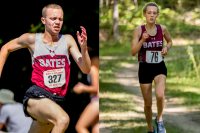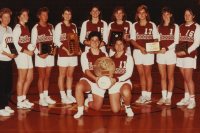
Allison Hill has never felt faster.
Hill, a Bates senior and the top-ranked 60-meter hurdler in the nation, explodes from the blocks. It’s the first, and the most anticipated, event for a Bates athlete at the 2017 NCAA Division III Indoor Track & Field Championships.
She clears the first two hurdles with ease. In the stands at suburban Chicago’s North Central College, Hill’s teammates scream, “Let’s go, Alley!”
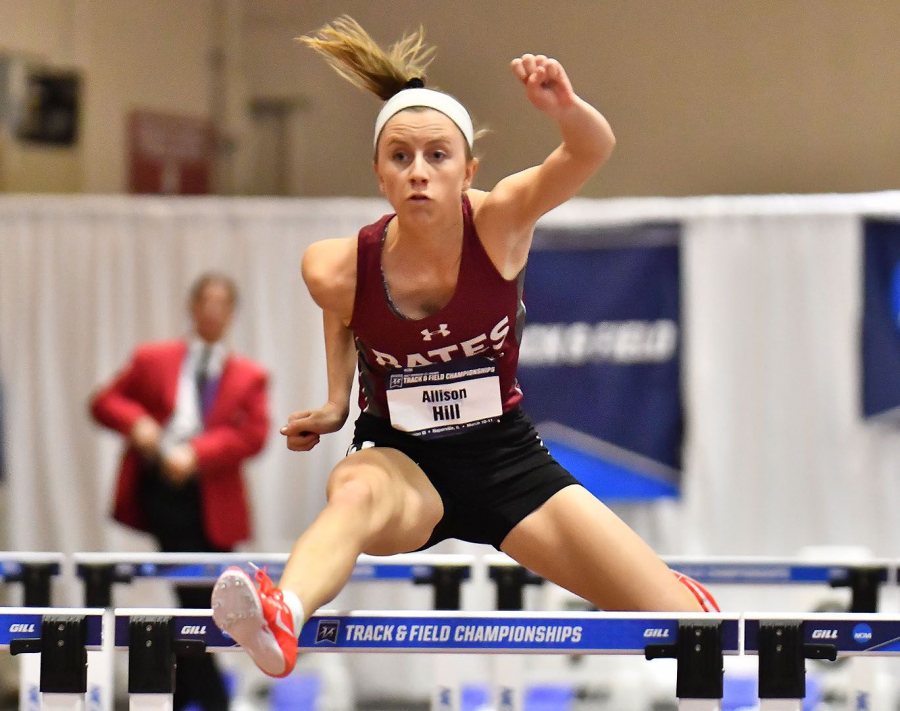
In her 60-meter hurdle preliminary race at the NCAA Indoor Track and Field Championships on March 10, Allison Hill ’17 clears the second hurdle before finding trouble at the third. (Photograph by d3photography.com)
One year ago, Hill finished ninth, just one-hundredth of a second from eighth place and All-America honors. The eight hurdlers who finished ahead of her all graduated, so the unspoken truth of this season is simple: Allison Hill has a very good shot at winning Bates’ first-ever national championship in the hurdles.
Hurdling requires perfect timing and Hill is going fast — maybe faster than ever before. Now approaching the third hurdle, she starts her takeoff too close to the hurdle, and her trail leg doesn’t get up in time. Her knee knocks the hurdle over, she falls, and suddenly everything has changed.
It’s 1:30 p.m. on Friday, March 10, 2017 — the first day of the two-day championship meet — and the story of Hill’s quest for an indoor national title is over before you can say, “It’s a tough day to be a Bobcat.”
But for Hill and her teammates, another story soon begins.
This year, the Bates women’s track and field team matched a program record by sending six athletes to the NCAA Indoor Championships. Fellow senior captains Jessica Wilson and Claire Markonic, plus junior Sally Ceesay and sophomores Ayden Eickhoff and Sarah Rothmann, join Hill.
All together, Bates is represented by a contingent of 15 athletes and coaches who made the more than 1,000-mile trip from Lewiston to Naperville. The men’s team qualified five athletes, including All-American weight thrower Adedire Fakorede of Newark, N.J., a junior who is the college’s student body president.
Hill’s very human moment in the 60-meter hurdles leaves everyone a little stunned, Hill most of all.
Fakorede is an impressive athlete who can throw a 35-pound weight more than 61 feet. Even he is in awe of Hill, a graceful, powerful, and tall (5-foot-9) sprinter who, in the fall, was a tenacious All-New England defender for the women’s soccer team.
“Allison is not human,” said Fakorede, who finished fourth in the nation this year in the weight throw. “Let me say that again: Allison Hill is not human.”
But Hill’s very human moment in the 60-meter hurdles leaves everyone a little stunned, Hill most of all.
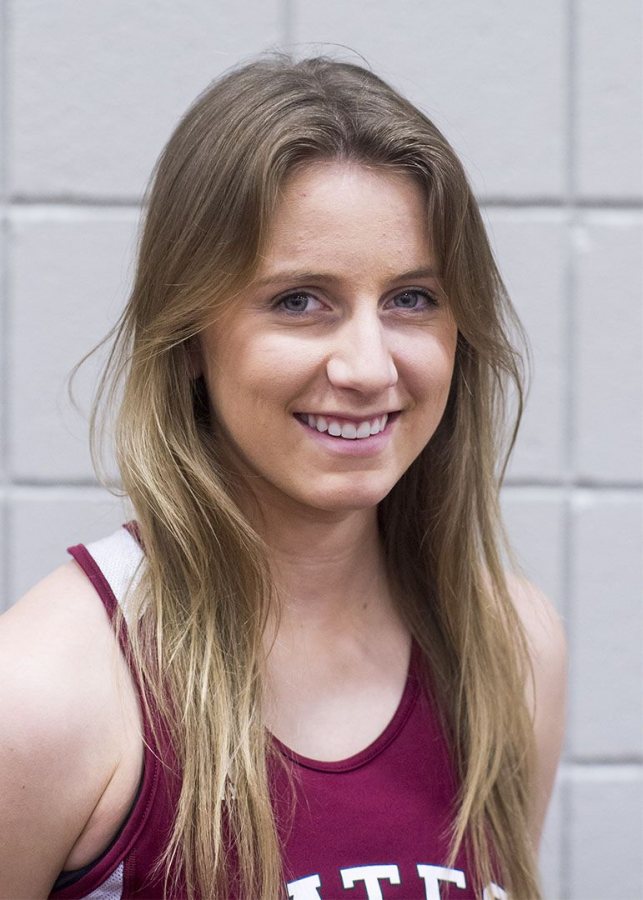
Falling in the 60-meter preliminary was “one of the most surreal feelings I’ve ever felt,” said Allison Hill ’17. (Josh Kuckens/Bates College)
“It’s one of the most surreal feelings I’ve ever felt,” Hill said later. “People might say, ‘Oh, she cracked under pressure,’ but I was so ready, I was so excited. I don’t want to know what I actually would have run if I could have finished because that probably will make me sad.”
Hill does not have any time to be sad now because her next race, the 200-meter dash, is coming up in just a couple hours. The 200-meter dash was almost an afterthought entering the weekend. Now, the race takes center stage for Hill.
“Before the season, we did not plan to have Alley run the 200-meter dash,” head coach Jay Hartshorn said. “But one meet at Boston University we gave her a week off from hurdles, she ran the 200-meter dash, and she qualified for nationals.”
Hill’s parents traveled halfway across the country from the family’s home in Brunswick, Maine, to watch her run. But she does not talk to them or anyone else during the short break between the 60-meter hurdles and the 200-meter dash. It is time for Hill to mentally get off the ground.
“I let some emotions out. Then I put all my energy and anger into the next event,” Hill said. “Everyone said I looked so mean running. I think it helped me to have a chip on my shoulder.”
It works: Two hours after the biggest disappointment of her collegiate career, Hill sets a personal flat track record in the 200-meter dash with a time of 25.27 seconds.
After missing All-America honors in 2016 by a hundredth of a second, she qualifies for Saturday’s finals by the same slim margin.
Fakorede was preparing for the weight throw in the same nearby gym where Hill warmed up for the 200-meter dash. “She was in the zone,” Fakorede said.
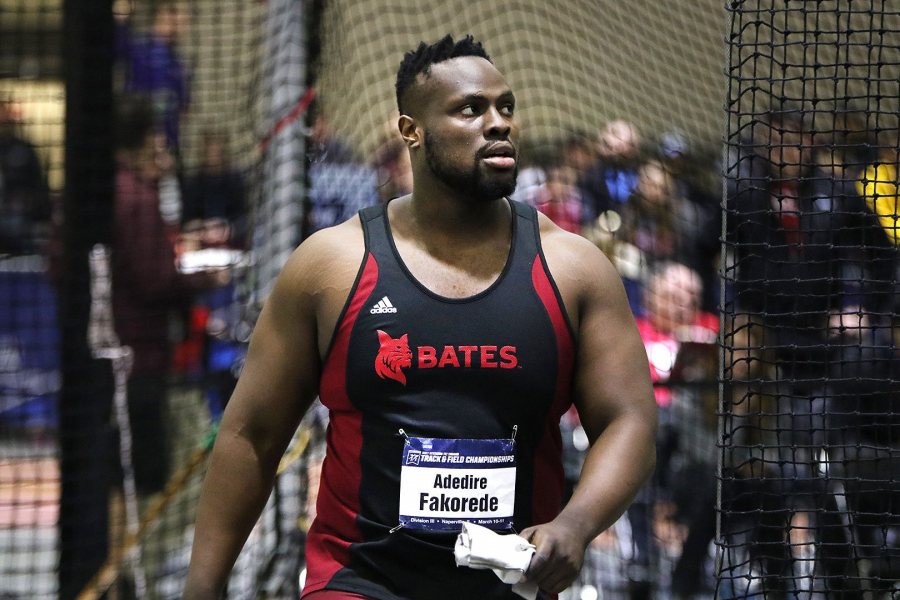
Weight thrower Adedire Fakorede ’18 of Newark, N.J., who earned All-America honors at the NCAA meet, saw Hill warming up for the 200-meter dash following her disappointment in the hurdles. “She was in the zone.” (Photograph by d3photography.com)
He saw Hill as she harnessed her emotions and began to refocus. The result: “She was killing her warm-ups. She was so into what she was doing. I’m not surprised that she set a P.R.”
Then Fakorede makes a prediction: “It’s just the beginning because tomorrow she’s definitely going to do something amazing. Because as I said earlier, Allison is not human.”
A day that could not have started any worse for the Bates women ends on a high note. Along with Hill’s performance in the 200, the distance medley relay team — which runs legs of 1,200, 400, 800, and 1,600 meters — finishes fourth in the final. It is the best DMR finish at nationals in Bates history, good for All-America honors for team members Rothmann, Markonic, Eickhoff, and Wilson.
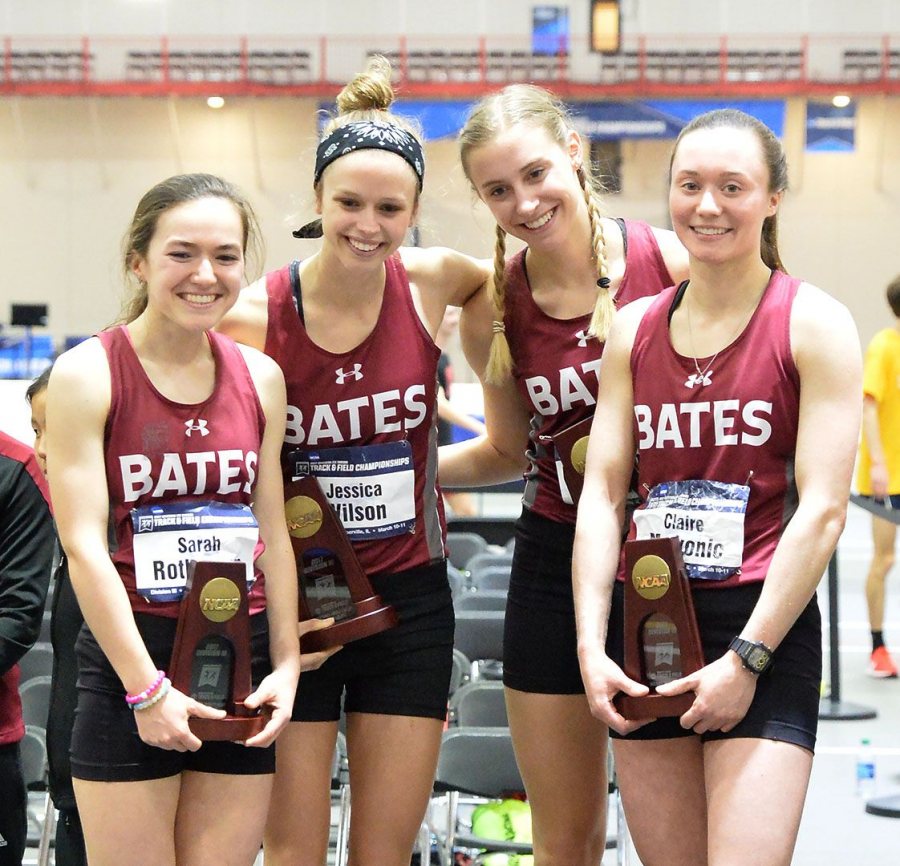
The All-America distance medley team of Sarah Rothmann ’19, Jessica Wilson ’17, Ayden Eickhoff ’19, and Claire Markonic ’17 pose with their fourth-place trophies at the NCAA Division III Indoor Track & Field Championships on March 10. (Photograph by d3photography.com)
It is now Saturday, day two of the meet. Eight runners are in the 200-meter final, and since the top eight will earn All-America honors, Hill only needs to avoid a false start to win the coveted award. A teammate jokes that Hill should just take a victory lap, do some cartwheels, maybe run backwards. After all, the hard part — qualifying for the finals — is over.
Hill does not false-start. Nor does she do a victory lap. Instead, she breaks her own school record, again. This time she runs to the finish in 25.22 seconds, good for fifth in the nation.
Hill is now the only Bobcat in program history to earn All-America honors in the 200-meter dash.
Sally Ceesay, a native of the Bronx, N.Y., is among the Bobcats who are impressed, but not necessarily surprised, by Hill’s comeback. Ceesay finished seventh in the triple jump for her second career indoor All-America finish earlier in the day.
“Alley is just a rock star,” said Ceesay, framing her admiration with a bit of slang: “She is my senior year goals.” Next year, she added, “I just want to get out there and go after it the way she does every single meet.”
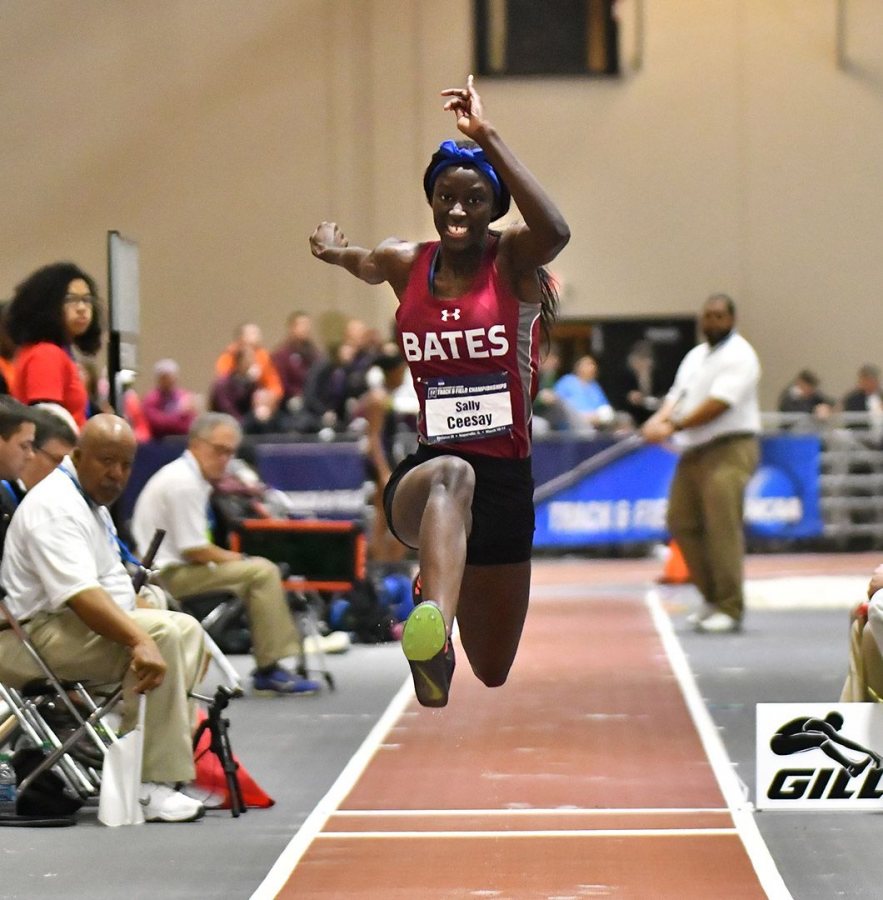
Triple jumper Sally Ceesay ’18 of Bronx, N.Y., earned All-America honors at the meet. Hill, she says, “is just a rock star.” (Photograph by d3photography.com)
Everyone gets to watch Hill run in the finals except for Cumberland, Maine, native Jessica Wilson, who is preparing for her individual event, the 3,000-meter run. Like Hill, Wilson is a Mainer and senior captain, majoring in environmental studies. But the similarities end there.
Standing 5-foot-6, Wilson is a middle-distance runner, a grinder who, in the fall, led the women’s cross country team to an NCAA championships appearance for the fourth time in program history. In the winter and spring, she is a track star in her own right, twice earning All-America honors with the DMR team.
What really stands out about Wilson is that every time you speak to her about her sport, you come away feeling that you learned something. She is cool, calm and very analytical.
Wilson makes it look easy in the 3,000-meter run, coming in fifth place, good for another All-America finish. But it was not easy, not easy at all.
The previous day, Wilson anchored the DMR team’s All-America finish by running the final 1,600 meters. Tack on an additional 3,000 meters less than 24 hours later and her fifth-place finish becomes even more impressive.
“I’m exhausted,” Wilson said. “It hurt, it really hurt. About halfway through you come to the realization how much it’s physically and mentally hurting you. But you just have to be comfortable with being uncomfortable. It’s less than 10 minutes of running and you can do anything for 10 minutes.”
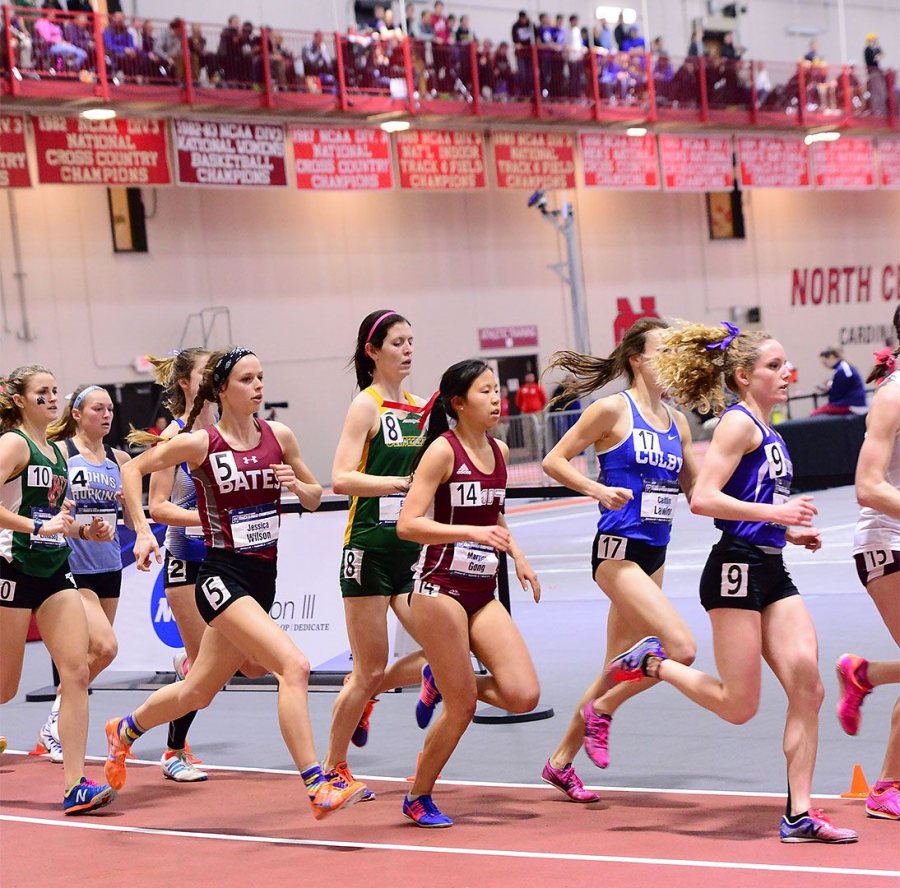
Jessica Wilson ’17 (No. 5) competes in the 3,000-meter run en route to a fifth-place finish. “It hurt, it really hurt,” she said. “But you just have to be comfortable with being uncomfortable.” (Photograph by Lynda Kelley / d3photography.com)
Wilson learns after her race that Hill finished fifth in the 200 meters and her face lights up. Wilson’s voice goes up an octave in happiness: “That’s amazing, I’m going to cry! I didn’t know Alley got fifth, I am so proud of her!”
Reflecting on what transpired the day before, Wilson says that “the whole team really felt for Alley, and we really wanted her to do well. She, out of anyone, deserves to be an All-American and she, out of anyone, deserves to be happy. She’s worked so hard for this.”
Her teammates’ support is not lost on Hill.
“The fact that my teammates were emotional that I was emotional after my race, it really meant a lot,” Hill said. “We care so much for each other because we see how hard we all work in practice, everything we put on the table and everything we do every day. I was cheering for Jess when I was cooling down in there, and to see both of us get fifth as captains and as Mainers is awesome.”
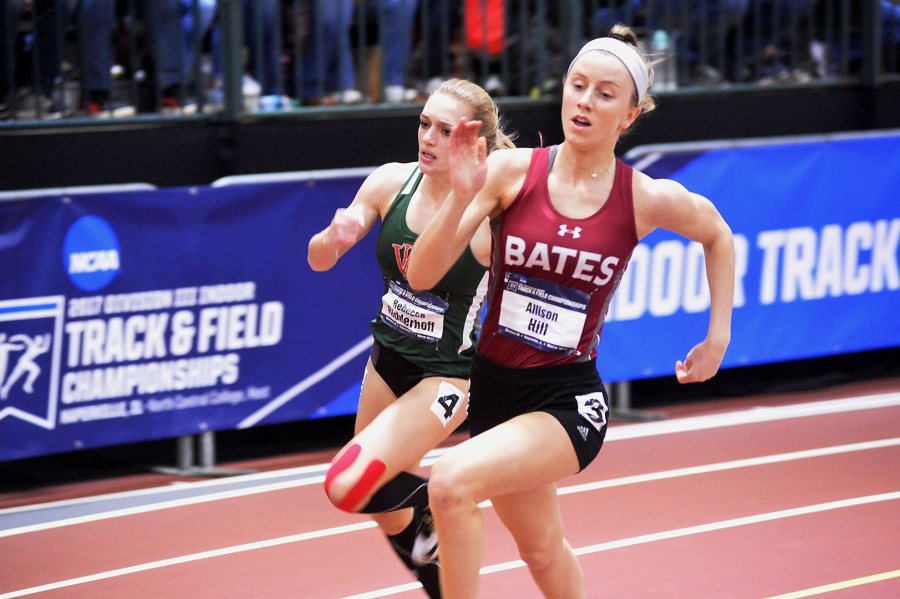
Allison Hill competes in the finals of the 200-meter dash, in which she posted a surprise fifth-place finish on March 11 at the NCAA Indoor Track and Field Championships. (Photograph by d3photography.com)
Hill’s sudden failure in the 60-meter hurdles could have been overwhelming for both her and the team. But it didn’t overwhelm either. In fact, it inspired them to do even better.
“I think Alley’s ability to overcome helped motivate everyone to make the most of the meet,” said Hartshorn.
The women finished the two-day event with 15 points and a tie for 11th place out of 70 scoring teams and 112 participating schools. Their seven All-Americans are the most in program history, and the team’s 11th-place finish is their best since 2006.
The indoor season is now over, and the outdoor season quickly approaches.
Last year, Hill finished seventh in the 100-meter hurdles at the NCAA Outdoor Track and Field Championships. Already an outdoor All-American in that event, she wants more for the final chapter of her college career.
“Once I got my composure back after the 60-meter hurdles, I immediately thought: ‘Time for outdoors,’” Hill said. “The NCAA Championships actually conflict with graduation. But after what happened here, there is no way I’m not going to nationals. When it’s right there, you just want to take it.”
For Hill and her teammates, another story soon begins.
